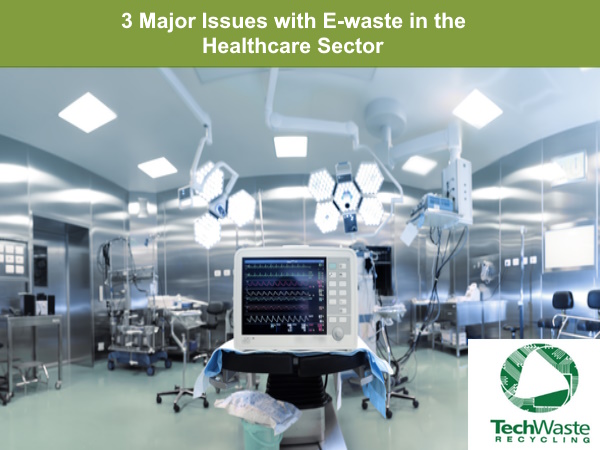Significant and ongoing developments in medical technology have improved patient diagnosis, care, and rehabilitation. However, the industry is creating alarming amounts of electronic waste as medical equipment becomes outdated more quickly.
Most of this e-waste is transported to an unidentified location, probably landfills. Toxic chemicals from medical equipment can have a very negative impact on the local environment and community. In addition, healthcare facilities must effectively delete and destroy any patient data that has been stored digitally in order to comply with legal obligations.
Improper e-waste disposal in the medical industry can have negative, far-reaching effects.
What exactly is E-waste in the Healthcare Industry?
Electronic waste, or “e-waste,” refers to items like cellphones, servers, printers, hard drives, and other gadgets. Computers, microscopes, lab analyzers, and more specialized medical equipment like sphygmomanometers, electrocardiograms, and spectrophotometers are examples of e-waste in the healthcare sector.
Hospitals, treatment facilities, toxicology labs, doctor’s offices, urgent care centers, dental offices, cosmetic surgery clinics, and other medical facilities commonly produce this kind of healthcare e-waste.
Biomedical electronic equipment is regarded as a hazardous material when it is disposed of because it contains potentially harmful substances like heavy metals. This is just one of the reasons why responsible disposal is essential.
3 Main Issues with E-waste in the Healthcare Sector
Let’s now examine the top 3 issues regarding e-waste in the healthcare sector.
HIPAA Adherence
Most of the electronics used in hospitals and clinics are data storage devices, and the data they store is sensitive, personal data about patients’ medical histories. Healthcare providers are required by the Health Insurance Portability and Accountability Act (HIPAA) to uphold health data security and confidentiality at all times, including after the disposal of data-storing technology.
The Health Insurance Portability and Accountability Act mandates that all information stored on a device, be it a computer or hard drive, be completely destroyed or shredded, not just erased.
Data protection
Data security must be taken into account when managing e-waste in order to comply with HIPAA. If your healthcare facility is to adhere to HIPAA, PCI DSS (Payment Card Industry Data Security Standard), FACTA (Fair and Accurate Credit Transactions Act), and GLBA (The Gramm-Leach-Bliley Act) regulations, it is imperative that you hire a high-quality, professional hard drive destruction service.
The Payment Card Industry Data Security Standard (PCI DSS) is a security protocol for handling credit cards from well-known card companies.
The Fair and Accurate Credit Transactions Act (FACTA) was added to the Fair Credit Reporting Act (FCRA) primarily to protect consumers from identity theft. The Act establishes standards for the confidentiality, reliability, and destruction of consumer information and places restrictions on its dissemination.
The Gramm-Leach-Bliley Act (GLB Act or GLBA) is a US federal law that demands financial institutions describe how they share and safeguard the private information of their customers. It is also known as the Financial Modernization Act of 1999.
You must ensure that all private or protected information is securely destroyed before your old electronics are thrown away or recycled in order to avoid identity theft and other security breaches.
Impact of E-waste on the Environment and Human Health
Computers, phones, and other common electronic medical equipment all contain harmful substances and chemicals. Improper disposal of these items can have a disastrous impact on the environment and people’s health.
Several potentially hazardous substances, including the following, are found in biomedical electronic equipment:
- Lead, used in CRT monitors and other devices
- Copper and titanium-niobium from MRI magnets
- Cadmium, used in batteries, plastics, resistors, and CRTs
- Mercury, used in LCDs
- Brominated flame retardants, used in computer housing and circuit boards
- Chlorinated plastics (PVC), used in cables and wiring
Furthermore, a startling 70% of e-waste finds itself in an undeclared or unidentified location, most likely in a landfill. These harmful materials can affect nearby ecosystems, contaminate food, and even endanger human health once they are dumped in a landfill and begin to drain into the groundwater.
Approaching the Challenges of Recycling Medical Lab Equipment
Recycle your medical e-waste in a responsible manner. Working with a qualified, certified e-waste disposal company will help you fulfill your HIPAA obligations, protect your patient’s data, and protect the environment and human health from the harmful effects of e-waste.
Electronic recycling R2-certified companies, like TechWaste Recycling, may manage your e-waste disposal. Call them to schedule a pickup. areas served.
https://pinbig.com/the-trump-coin-tornado%f0%9f%92%b8/


































